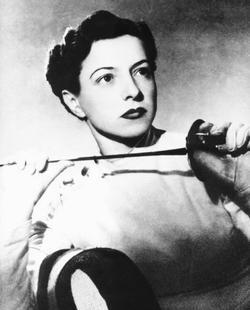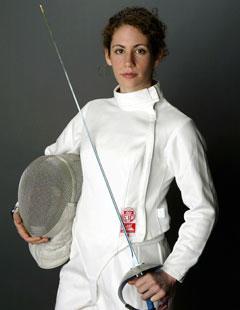Fencers
Fencing is an ancient sport with modern sensibilities, and since it calls for grace, agility, and strategic thinking over pure brawn, it seems natural that women should excel at it. It is also a multigenerational sport: Olympic fencers range in age from teens to athletes in their forties. And their status as Olympic athletes extends their impact beyond the fencing strip: Olympic gold medalist Ilona Elek scored a major point against Hitler’s racism and anti-Semitism, and Sada Jacobson, ranked number one in the world in 2003, is working to make the sport even more inclusive, extending fencing’s reach to economically disadvantaged children.
One of the greatest-ever Olympic victories, immortalized in the public imagination and the pages of history books, was not the triumph of one athlete over another but of an athlete over an ideology. When Jesse Owens won gold at the 1936 Olympic Games in Berlin, his victories soundly disproved Adolf Hitler’s notion of Aryan supremacy. Owens, a black American, took home four gold medals, making him the most successful athlete at the Games.
Hitler saw the Berlin Olympics as a means of promoting Nazi ideals of racial superiority through sport. He only relented and allowed all ethnicities to participate when threatened by the International Olympic Committee, who had grown concerned over reports that Jewish athletes were being persecuted in Germany.
Part of Hitler’s appeal to the Committee involved putting a Jewish woman, fencer Helene Mayer, on the German Olympic team. If he’d paid attention to her event, what he saw surely would have humiliated him as much as Owens’s wins.
Had they attended the finals of women’s fencing, the Nazi high command would have witnessed a shocking scene: Ellen Preis of Austria won the bronze. Helene Mayer took the silver. And Hungarian Ilona Elek won the gold. All three women were Jewish.
Elek was already 29 when she competed in her first Olympics, and was the only woman who had not yet won an Olympic championship (Preis and Mayer had won the previous two). Her victory marked the fifth Olympics in a row where a Jewish woman had won the gold medal in foil. She is the only woman to win two Olympic gold medals in the individual foil competition.
Ilona Elek’s victory in 1936 would not be her last--though the Olympics were cancelled in 1940 and 1944, she competed again in 1948 at age 41 and won gold yet again. She was 45 when she competed in the 1952 Helsinki Olympics, her last. To this day, Ilona Elek is the most decorated female fencer of all time.
For Sada Jacobson, fencing is a family affair. Her father David was a member of the 1974 US Men's Sabre National Team, and her mother and two younger sisters fence as well: Sada and her sister Emily were teammates at the 2004 Olympic Games in Athens, Greece. Her family history helps explain how a girl from Georgia got involved in such an unusual sport, but is only part of the story of how she became the first American woman to be ranked number one in the world.
Jacobson took up fencing in high school, then continued training and competing in college as a member of the Yale Varsity Fencing Team. Rising quickly through the ranks of women’s sabre, she took home two NCAA Championship titles in 2001 and 2002. Then in 2004, the first year the Olympics allowed women fencers to compete in sabre, Jacobson won bronze at the Olympic Games in Athens. She returned to the Games in 2008, bringing home silver and bronze medals from Beijing.
Her legacy is not limited to Olympic achievement: Jacobson made history when she won two World Cup championships in a row, becoming the first US woman and second US fencer to ever rank number one in the world. She has been twice honored by the Jewish Sports Hall of Fame, receiving the Marty Glickman Award in 2002 and 2005.
After a decade of competition, Jacobson retired from fencing and went to law school. But even today, she is never far from fencing: she is Vice Chair of the Arkady Burdan Foundation, an Atlanta organization that teaches disadvantaged children to fence. By helping to provide access to young people who would otherwise likely never be exposed to fencing, Jacobson is inspiring a new generation of fencers and carrying the torch passed to her by her parents and her historical predecessors like Ilona Elek.




